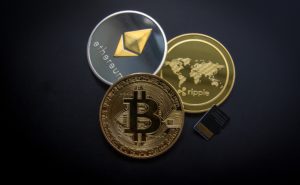Investing is about Balancing Risk with Return
Investors, more often than not, are optimistic people. Up until a few months ago, how couldn’t you have been optimistic? We enjoyed a decade-long bull market, so it was hard to imagine stock prices could go in any direction but up. However, every investment comes with a set of risks. Some risks are easy to identify. Certain companies may be obviously lagging behind their competitors. Others may fail to keep up with changing consumer trends. Some risks, however, aren’t so easy to assess. Investors may never be able to price in the possibility of leadership scandals like those of Carlos Ghosn of Renault and Adam Neumann of WeWork. And of course, all investors have to contend with the possibility of crises. In a world full of uncertainty, how can we make investments that perform well even if SHTF? The coronavirus is wiping out the life savings of billions of people across the world. Are there prepper investments out there that can actually increase wealth throughout crises? My answer is yes. In fact, I’ve come up with five. Here are the five prepper investments you can make during good times and bad to insulate your wealth from most SHTF events.
1. Precious Metals
Why Precious Metals?
Precious metals are valuable due to simple supply and demand economics. There is a finite supply of natural resources. Precious metals like gold and silver, therefore, are scarce relative to man-made stores of value like paper currency. One of the primary benefits of investing in precious metals is that they serve as hedges against inflation. Recently, the United States Federal Reserve injected trillions of dollars into the economy. I worry that this unprecedented capital injection will ultimately cause the prices of goods to rise. A lot.
When price inflation occurs, the purchasing power of a dollar decreases. In a hyper-inflationary US economy, dollars are no longer good stores of value. Each day that I store dollars in my wallet, my wealth erodes. To be clear, a little bit of inflation is good for the economy. In fact, the Federal Reserve targets roughly 2 percent inflation each year. The inflation I’m expecting to arise a couple years from now as a result of the coronavirus stimulus plan, however, will be devastating. History shows us that hyper-inflationary environments impoverishes populations. We need to protect ourselves from this possibility.
Why Now?
You should be investing in scarce assets, like precious metals, right now. The Federal Reserve cannot print precious metals in the way they can print dollars. Given the stock market has irrationally recovered most of its losses, the prices of precious metals is pretty low relative to where they’ll ultimately go. I recommend prepper investments in precious metals now before inflation hits. You’ll see a healthy return on your investment as those slower to invest look to protect themselves from inflation.
How Do I Invest in Precious Metals?
There are a couple of ways to invest in precious metals. You can purchase bullion online or at a reputable precious metals dealer. This tangible investment is ideal should SHTF one day. Some investors also like the comfort that comes with being able to hold onto an investment. Bullion, however, isn’t liquid. You must find a buyer willing to exchange currency for your physical bullion, which isn’t always easy.
For this reason, some investors may be more comfortable investing in a precious metals ETF, or Exchange Traded Fund, through an online brokerage. So far this year, Palladium (PALL) and Gold (AAAU) ETFs have returned over 40% and 30%, respectively. ETF investments are far more liquid in that you have a large market of buyers identified through your online broker, which enables you to quickly exit your investment. Whichever method you choose, precious metals are one of the best prepper investments you can make.
2. Cryptocurrency
New and Improved Currency
In light of the coronavirus pandemic, cryptocurrency investments seem like a no-brainer. Paper currency is dirty and can spread viruses. Even when we’re not in the midst of a pandemic, we all know that paper currency can be easily lost or stolen. A check, another form of paper currency, is incredibly inefficient. The US government mailed millions of US citizens paper checks, which then had to be deposited through a bank. It’s 2020. There is a much easier way to store and transfer value between people and institutions: cryptocurrency.
 Cryptocurrencies like Bitcoin and Ethereum have seen renewed interest recently. Bitcoin, like precious metals, is a hedge against inflation. To control the supply of Bitcoin in circulation, the reward Bitcoin “miners” are paid for mining Bitcoin is reduced by half on a periodic basis. The most recent “halving” took place on May 11, 2020. By reducing mining incentives, Bitcoin is mined at a slower pace. There are no massive Bitcoin injections by a centralized authority. In fact, there isn’t a centralized authority controlling Bitcoin at all.
Cryptocurrencies like Bitcoin and Ethereum have seen renewed interest recently. Bitcoin, like precious metals, is a hedge against inflation. To control the supply of Bitcoin in circulation, the reward Bitcoin “miners” are paid for mining Bitcoin is reduced by half on a periodic basis. The most recent “halving” took place on May 11, 2020. By reducing mining incentives, Bitcoin is mined at a slower pace. There are no massive Bitcoin injections by a centralized authority. In fact, there isn’t a centralized authority controlling Bitcoin at all.
No Government Necessary
Recently, people across the globe have grown skeptical of their governments. Botched coronavirus responses justifies this skepticism. Fiat currencies like US dollars, Euros, and Chinese Yuan are, of course, subject to government control. Decentralized currencies, like Bitcoin, will help you sleep soundly at night. You’ll no longer need to trust your government to properly manage its currency. Make no mistake, cryptocurrencies aren’t yet perfect. They’re volatile, come with high transaction costs, and require a lot of energy to mine. That said, I’m investing for the long term. Trust in government will not increase over time. I have much greater trust in technologists’ abilities to resolve some of the issues with cryptocurrencies we’re seeing today.
3. Real Estate
Historically, home ownership has been one of the primary means by which people build wealth. The Survey of Consumer Finances found that the average homeowner has household wealth of  $231,420, while the average renter has household wealth of $5,200. Now, different markets, time periods, and financial situations will dictate whether buying a home is a better decision than renting. That said, over time, real estate tends to appreciate in value. And, by taking out and paying off a mortgage, you own a tangible asset that provides you and your family with shelter.
$231,420, while the average renter has household wealth of $5,200. Now, different markets, time periods, and financial situations will dictate whether buying a home is a better decision than renting. That said, over time, real estate tends to appreciate in value. And, by taking out and paying off a mortgage, you own a tangible asset that provides you and your family with shelter.
The coronavirus pandemic has shown how exposed landlords can be to the fragility of markets. Therefore, I’m not suggesting you look to build a real estate empire. I’m instead saying that you should invest in the home you occupy. Even if the real estate market takes a temporary hit, the same home continues to offer you and your family shelter. It still retains its utility through bull markets and bear markets. And, when markets improve, you can sell your home at a profit.
4. High Yield Savings Account
 High yield savings accounts are ideal for storing rainy day funds. They’re safe, they’re liquid, and they earn returns, albeit modest ones. The beauty of high yield savings accounts is that you cannot lose your investment unless the bank itself collapses. Traditional wisdom suggests that you should invest your savings in the stock market. Your 401k, IRA, and even rainy day funds are supposed to be invested in stock indexes. But, we’re not living through a “traditional” crisis. We’re in the midst of an unprecedented economic meltdown. You should do yourself a favor. Protect your wealth. Invest in a high yield savings account until there’s a little more certainty about when we’ll return to some semblance of normalcy. Sometimes the best prepper investments are the safest investments. You can’t get much safer than a high yield savings account.
High yield savings accounts are ideal for storing rainy day funds. They’re safe, they’re liquid, and they earn returns, albeit modest ones. The beauty of high yield savings accounts is that you cannot lose your investment unless the bank itself collapses. Traditional wisdom suggests that you should invest your savings in the stock market. Your 401k, IRA, and even rainy day funds are supposed to be invested in stock indexes. But, we’re not living through a “traditional” crisis. We’re in the midst of an unprecedented economic meltdown. You should do yourself a favor. Protect your wealth. Invest in a high yield savings account until there’s a little more certainty about when we’ll return to some semblance of normalcy. Sometimes the best prepper investments are the safest investments. You can’t get much safer than a high yield savings account.
5. Other Alternative Assets
My favorite alternative assets are those you can drink. Wine and whiskey have both proven to be remarkably good investments. Like all good investments, wine and whiskey markets conform to the laws of supply and demand. Good wines and whiskies are only offered in limited supply. There is a limit to how many acres on which grapes can be grown. Likewise, there is only so much  barley that can be malted or mash that can be made. Many wine and whiskey “rules” also ensure greater scarcity of these alternative assets.
barley that can be malted or mash that can be made. Many wine and whiskey “rules” also ensure greater scarcity of these alternative assets.
Scotch whiskey, as an example, must be aged within Scotland for at least 3 years in oak barrels. Aging the whiskey requires space in Scotland, of which there is only a limited amount. Some of the most expensive wine is grown from grapes on small plots of land. Only 7,000 cases of Pappy Van Winkle, one of the most expensive bourbons on the market, are released each year. The scarcity principle has propelled the values of wine and whiskey bottles upwards over time. Let’s also not forget that wine and whiskey have utility. My memories of time spent enjoying good wine or whiskey with good company are some of the best I have.
Make Your Prepper Investments in a Downturn
As a result of the coronavirus, we’re experiencing a downturn that may be on par with the Great Depression. For many prepper investments, the time to buy is now. As the stock market continues to drop, precious metals and cryptocurrencies will rise. If you have a mortgage, consider refinancing. If you rent, look into buying as home prices come down. Don’t yet have a rainy day fund? Consider putting money into a high yield savings account to protect yourself from market volatility. And lastly, think about other alternative assets. Don’t limit yourself to wine or whiskey. There are plenty of other assets out there, like art, stamps, rare books, and watches that may be of greater interest to you. Again, we’re at an unprecedented point in history. Protect yourself by protecting your finances. Make your prepper investments today.
Do you agree with this list of prepper investments? Do you have other recommendations? Leave a comment below or contact me directly.




What about the Permanent Portfolio? Developed by Harry Browne back in the 70s. Do you have any opinions on that as an investment vehicle?
I worry about the 25% allocation in long term Treasury Bonds… we’re entering uncharted waters as governments around the world continue to print money. This will ultimately create inflationary pressure and devalue dollars and bonds. Browne says little about alternative assets like real estate, which tend to appreciate in value in inflationary environments. I’d imagine equities will also perform well.
Point is, conventional wisdom may no longer apply. Just my two cents